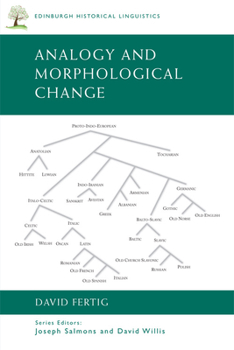Analogy and Morphological Change
(Part of the Edinburgh Historical Linguistics Series)
Select Format
Select Condition 
Book Overview
How do learners and speakers make sense of their language and make their language make sense. Is it dived or dove? Dwarfs or dwarves? If the best students aced the test, did the pretty good students beece it? You've probably often pondered such questions yourself, but did you know that similar questions have inspired some of the most important advances in our understanding not only of how languages change but also of how children acquire grammar and how the human mind works? This book is designed to help readers make sense of morphological change and, more generally, of the concept of analogy and its role in language and in human cognition. With a critical look at the past 150 years of linguistic work on analogical change, David Fertig brings clarity to a field rife with terminological and theoretical confusion.
Related Subjects
Language Arts




